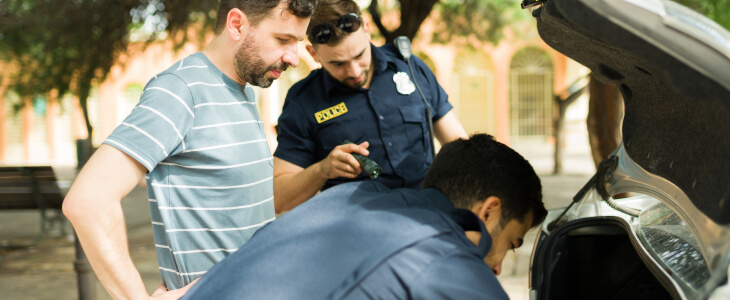
Pulled Over? What You Should Know About the Legality of Car Searches
You have been pulled over by Spartanburg law enforcement for speeding — so it catches you off guard when the officer asks if they can search your car. For many law-abiding drivers, the thought of police searching through their cars as part of a routine traffic stop is unsettling.
Can police search your car without your consent? While there are limits to their authority, police can and will search your car if they believe they have probable cause.
“Probable cause” is a legal term you may have heard, but only a few non-law-trained individuals can define it. Understanding the concept and how it operates when police ask to search your car, though, is essential to protecting your constitutional rights.
Defining Probable Cause Is Difficult
When defining probable cause, courts usually emphasize that the term requires objective facts that would cause a reasonable person to believe that evidence of a crime will be found in a particular place — like your vehicle. Examples of these objective facts include:
- The smell of marijuana coming from inside your vehicle
- Your statements to police that you have drug paraphernalia in your car
- Odors of air fresheners or other things that suggest you are trying to cover the smell of illegal drugs
- A trained K-9 unit alerting officers to the presence of drugs in your vehicle
It is up to the police to decide whether they have probable cause at the moment of their search. While their determination can be challenged later in court, there is no opportunity for you to question their determination on scene.
Police Can Search Your Car if They Have Probable Cause?
You might have learned in high school that the U.S. and South Carolina constitutions protect against unreasonable searches.
In general, this means that if law enforcement wants to search somewhere for evidence of a crime, they must get a warrant. The way they get a warrant is by showing a court there is probable cause to believe that evidence of a crime is located where they want to search.
What if a Police Officer Doesn’t Have a Warrant?
But can police search your car without a warrant? Yes, because there are numerous exceptions to the warrant requirement. One of the significant exceptions is for automobiles.
The U.S. Supreme Court has held that because of a car’s mobility, it is impractical to require police to get a warrant. For one thing, doing so would extend traffic stops for an unreasonable time. For another, if police were required to get a warrant, there’s a good chance the car would be driven away before the warrant could be executed.
What to Do if You Are Pulled Over
If you are stopped by police in South Carolina, remember that the answer to the question “Can police search your car?” is yes. Therefore, keep the following tips in mind:
- You do not have to, nor should you, verbally consent to a search of your car
- You do not have to answer an officer’s questions beyond identifying yourself and producing your license, registration, and insurance card if asked
- The officer does not need to get or produce a warrant to search your car
- If the officer indicates they will be searching your car, do not physically interfere — you can challenge the legality of the search later in court
If you refuse to allow officers to search your car after they have announced their intention, you could face additional criminal charges.
When should I contact my criminal defense lawyer?
You do not have the right to consult with an attorney at the moment when police stop you, so you should contact the Law Office of Mo Abusaft in Spartanburg after the traffic stop takes place. Our criminal defense team will help you protect yourself and your rights if police conduct an unlawful search or otherwise engage in prohibited conduct.
Contact our office today to discuss your case with us.
Categories
Civil rights Criminal defense Dui Domestic violence Drug crimes Firm news Mass-torts Murder Theft crimes Traffic-ticket-violations UncategorizedRecent Posts
How the South Carolina Stand Your Ground Law Works Difference Between Murder and Manslaughter in South Carolina What to Do If You’re Accused of Homicide in Spartanburg Common Defenses to Murder Charges in South Carolina Common Defenses to Murder in South Carolina